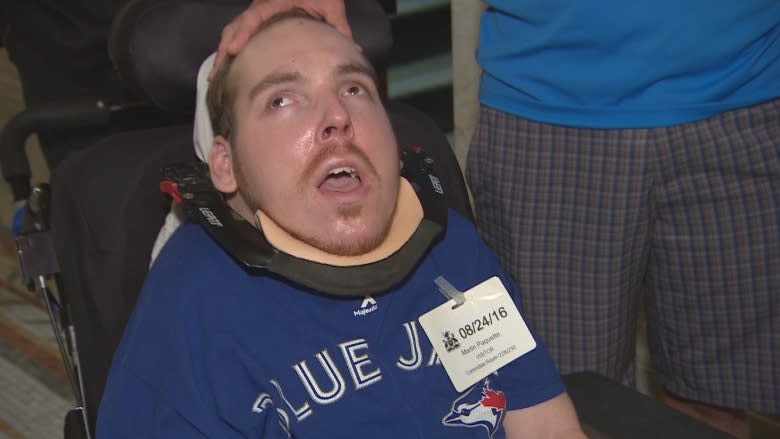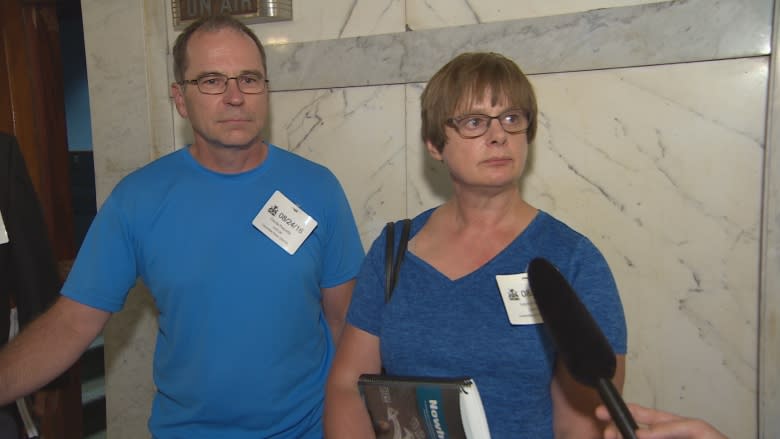Report may lead to change, say families of adults with developmental disabilities
An Ontario mother of a developmentally disabled son says she is hopeful that a provincial ombudsman's report delivered Wednesday will lead to change.
Leoni Paquette, a North Bay, Ont. resident, travelled with her husband Claude and their son, Martin, 25, to Toronto this week to hear Ontario Ombudsman Paul Dubé on Wednesday discuss chronic service gaps for adults with developmental disabilities.
The report, entitled Nowhere to Turn, says inconsistencies and service gaps for adults with disabilities are leaving them abandoned, abused and often languishing in jails and hospitals without proper care.
It calls for a sweeping, systematic overhaul of the entire care system, which Dube said has left families "desperate" because they face a maze of different social service agencies and are often left unable to find appropriate care. In a few cases, the report says families have had to abandon their loved ones.
"As you can see, it's really thick," Leoni said. "It's a lot to digest."
Leoni said the report hits home because Martin has been in a wheelchair since he was nine months old. Martin has cerebral palsy and a seizure disorder, is fed by a tube and needs 24-hour care.
"Martin has many needs," she said.
Leoni said the report sheds light on the daily struggles faced by families with adult children with developmental disabilities, a struggle that she and her husband have coped with for 25 years.
She said living with a developmentally disabled son has meant juggling his needs with that of her other children, getting on waiting lists to ensure Martin gets the proper medical care he needs from specialists, and developing long-term "transition" plans for Martin to enable him to get some of his needs met in the community.
It has also meant working with a number of different agencies and government ministries. The report describes services in Ontario as "fragmented."
"It's always been an influx of: Where do we turn? What's available for us? How do we keep on top of that? Where do we go to find out how we keep on top of that? Things always change. Staying on top of everything has been the hardest part," she said.
Some services for Martin disappeared when he turned 18. Before that, she said a friend encouraged her to think longer term and to seek out community supports. "We're still on waiting lists. I started transitioning him into the community when he was 14."
Claude Paquette said it has been a matter of caring, advocating, coping and worrying.
"If something were to happen to one of us, what happens to Martin? That's in the back of my mind always," he said. "If one of us even breaks a leg or something, it's full-time care with him, from five in the morning until he goes to bed at night," he said. "We're on edge, we're coping, but that's life."
But not all parents of developmentally disabled adults are as hopeful.
"If you look at the size of the report, It's a book," said Susan Buro, a St. Thomas, Ont. mother of a 22 year-old daughter with developmental disabilities and mental health issues. "And that just overwhelms me with all of those stories out there. But it's words. And we need action."
Buro, whose daughter is now in hospital waiting for a community placement, said she knows the provincial government can move slowly but families are in need of help now. She said she looks at the report from a "place of hopelessness" that comes from years of struggling to get government services. Her daughter suffers from epilepsy and metabolic disease.
"I understand that it's going to take time. We need solutions today."
Bure said rural areas are hard hit because they have no respite, no emergency beds, no crisis funding, little access to services, and day programs that might not accept an adult child if his or her needs are too complex. The areas also lack residential supports.
"I really hope it gets better," she said.





